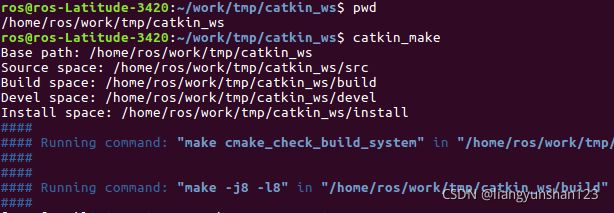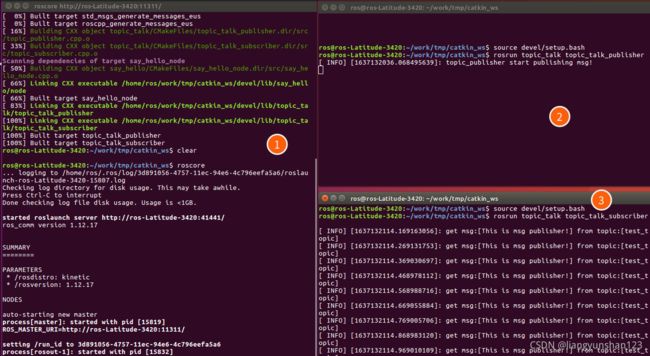基于ROS实现topic通信过程记录
系列文章目录
第一章Ubuntu中安装ROS环境
第二章基于ROS实现HelloWorld过程记录
第三章基于ROS实现topic通信过程记录
文章目录
系列文章目录
前言
一、创建topic_talk功能包
1.初始化topic_talk功能包
2.添加publisher源码
3.添加subscriber源码
二、编译功能包
1.修改功能包中CMakeLists.txt
2.编译生成目标文件
三、演示
总结
前言
在上一章,我们已经完成在ROS环境中实现最基本的HelloWorld过程记录,这一章,基于ROS环境实现基本的topic通信。
关于topic通信,接触过MQTT的攻城狮应该知道,Publisher(发布者)、Subscriber(订阅者)、Broker(代理或者服务端),发布者发布的消息经过代理转发给订阅者。
然而,在ROS中,topic消息是直接单向传输的,ROS中只有发布者与订阅者,这两者都是作为ROS中的一个通信节点,而通信节点是依赖roscore(节点管理器)的,Publisher向节点管理器注册需要发布的topic,Subscriber向节点管理器注册关心的topic以及topic消息的回调。注册成功后,Publisher通过Subscriber注册的回调传递topic消息。
一、创建topic_talk功能包
1.初始化topic_talk功能包
在创建功能包之前,需要先创建基本的工作空间,具体过程与基于ROS实现HelloWorld过程记录中的创作工作空间相同。
创建好工作空间后,在源码空间中创建topic_talk功能包,如下:
catkin_create_pkg topic_talk2.添加publisher源码
在topic_talk功能包源码目录中添加publisher的源码文件,如下:
mkdir src/ include/
touch src/topic_publisher.cpptopic_publisher.cpp文件源码如下:
#include
#include
const char *topic_name = "test_topic";
const char *node_name = "topic_publisher";
int main(int argc, char *argv[])
{
ros::init(argc, argv, node_name);
ros::NodeHandle handle;
ros::Publisher topic_publisher = handle.advertise(topic_name, 10);
ros::Rate loop_rate(10);
ROS_INFO("%s start publishing msg!", node_name);
while (ros::ok())
{
std_msgs::String test_msgs;
test_msgs.data = "This is msg publisher!";
topic_publisher.publish(test_msgs);
loop_rate.sleep();
}
return 0;
}
3.添加subscriber源码
touch src/topic_subscriber.cpptopic_subscriber.cpp文件源码如下:
#include
#include
const char *topic_name = "test_topic";
const char *node_name = "topic_subscriber";
void show_msg_callback(const std_msgs::String::ConstPtr& msg)
{
ROS_INFO("get msg:[%s] from topic:[%s]", msg->data.c_str(), topic_name);
}
int main(int argc, char *argv[])
{
ros::init(argc, argv, node_name);
ros::NodeHandle n;
ros::Subscriber topic_subscriber = n.subscribe(topic_name, 10, show_msg_callback);
ros::spin();
return 0;
}
二、编译功能包
1.修改功能包中CMakeLists.txt
在topic_talk功能包中的CMakeLists.txt文件修改如下所示:
cmake_minimum_required(VERSION 3.0.2)
project(topic_talk)
## Compile as C++11, supported in ROS Kinetic and newer
# add_compile_options(-std=c++11)
## Find catkin macros and libraries
## if COMPONENTS list like find_package(catkin REQUIRED COMPONENTS xyz)
## is used, also find other catkin packages
find_package(catkin REQUIRED COMPONENTS
roscpp
std_msgs
)
## System dependencies are found with CMake's conventions
# find_package(Boost REQUIRED COMPONENTS system)
## Uncomment this if the package has a setup.py. This macro ensures
## modules and global scripts declared therein get installed
## See http://ros.org/doc/api/catkin/html/user_guide/setup_dot_py.html
# catkin_python_setup()
################################################
## Declare ROS messages, services and actions ##
################################################
## To declare and build messages, services or actions from within this
## package, follow these steps:
## * Let MSG_DEP_SET be the set of packages whose message types you use in
## your messages/services/actions (e.g. std_msgs, actionlib_msgs, ...).
## * In the file package.xml:
## * add a build_depend tag for "message_generation"
## * add a build_depend and a exec_depend tag for each package in MSG_DEP_SET
## * If MSG_DEP_SET isn't empty the following dependency has been pulled in
## but can be declared for certainty nonetheless:
## * add a exec_depend tag for "message_runtime"
## * In this file (CMakeLists.txt):
## * add "message_generation" and every package in MSG_DEP_SET to
## find_package(catkin REQUIRED COMPONENTS ...)
## * add "message_runtime" and every package in MSG_DEP_SET to
## catkin_package(CATKIN_DEPENDS ...)
## * uncomment the add_*_files sections below as needed
## and list every .msg/.srv/.action file to be processed
## * uncomment the generate_messages entry below
## * add every package in MSG_DEP_SET to generate_messages(DEPENDENCIES ...)
## Generate messages in the 'msg' folder
# add_message_files(
# FILES
# Message1.msg
# Message2.msg
# )
## Generate services in the 'srv' folder
# add_service_files(
# FILES
# Service1.srv
# Service2.srv
# )
## Generate actions in the 'action' folder
# add_action_files(
# FILES
# Action1.action
# Action2.action
# )
## Generate added messages and services with any dependencies listed here
# generate_messages(
# DEPENDENCIES
# std_msgs
# )
################################################
## Declare ROS dynamic reconfigure parameters ##
################################################
## To declare and build dynamic reconfigure parameters within this
## package, follow these steps:
## * In the file package.xml:
## * add a build_depend and a exec_depend tag for "dynamic_reconfigure"
## * In this file (CMakeLists.txt):
## * add "dynamic_reconfigure" to
## find_package(catkin REQUIRED COMPONENTS ...)
## * uncomment the "generate_dynamic_reconfigure_options" section below
## and list every .cfg file to be processed
## Generate dynamic reconfigure parameters in the 'cfg' folder
# generate_dynamic_reconfigure_options(
# cfg/DynReconf1.cfg
# cfg/DynReconf2.cfg
# )
###################################
## catkin specific configuration ##
###################################
## The catkin_package macro generates cmake config files for your package
## Declare things to be passed to dependent projects
## INCLUDE_DIRS: uncomment this if your package contains header files
## LIBRARIES: libraries you create in this project that dependent projects also need
## CATKIN_DEPENDS: catkin_packages dependent projects also need
## DEPENDS: system dependencies of this project that dependent projects also need
catkin_package(
# INCLUDE_DIRS include
# LIBRARIES topic_talk
# CATKIN_DEPENDS roscpp rospy std_msgs
# DEPENDS system_lib
)
###########
## Build ##
###########
## Specify additional locations of header files
## Your package locations should be listed before other locations
include_directories(
include
${catkin_INCLUDE_DIRS}
)
## Declare a C++ library
# add_library(${PROJECT_NAME}
# src/${PROJECT_NAME}/topic_talk.cpp
# )
## Add cmake target dependencies of the library
## as an example, code may need to be generated before libraries
## either from message generation or dynamic reconfigure
# add_dependencies(${PROJECT_NAME} ${${PROJECT_NAME}_EXPORTED_TARGETS} ${catkin_EXPORTED_TARGETS})
## Declare a C++ executable
## With catkin_make all packages are built within a single CMake context
## The recommended prefix ensures that target names across packages don't collide
# add_executable(${PROJECT_NAME}_node src/topic_talk_node.cpp)
add_executable(${PROJECT_NAME}_publisher src/topic_publisher.cpp)
add_executable(${PROJECT_NAME}_subscriber src/topic_subscriber.cpp)
## Rename C++ executable without prefix
## The above recommended prefix causes long target names, the following renames the
## target back to the shorter version for ease of user use
## e.g. "rosrun someones_pkg node" instead of "rosrun someones_pkg someones_pkg_node"
# set_target_properties(${PROJECT_NAME}_node PROPERTIES OUTPUT_NAME node PREFIX "")
## Add cmake target dependencies of the executable
## same as for the library above
# add_dependencies(${PROJECT_NAME}_node ${${PROJECT_NAME}_EXPORTED_TARGETS} ${catkin_EXPORTED_TARGETS})
## Specify libraries to link a library or executable target against
# target_link_libraries(${PROJECT_NAME}_node
# ${catkin_LIBRARIES}
# )
target_link_libraries(${PROJECT_NAME}_publisher
${catkin_LIBRARIES}
)
target_link_libraries(${PROJECT_NAME}_subscriber
${catkin_LIBRARIES}
)
#############
## Install ##
#############
# all install targets should use catkin DESTINATION variables
# See http://ros.org/doc/api/catkin/html/adv_user_guide/variables.html
## Mark executable scripts (Python etc.) for installation
## in contrast to setup.py, you can choose the destination
# catkin_install_python(PROGRAMS
# scripts/my_python_script
# DESTINATION ${CATKIN_PACKAGE_BIN_DESTINATION}
# )
## Mark executables for installation
## See http://docs.ros.org/melodic/api/catkin/html/howto/format1/building_executables.html
# install(TARGETS ${PROJECT_NAME}_node
# RUNTIME DESTINATION ${CATKIN_PACKAGE_BIN_DESTINATION}
# )
## Mark libraries for installation
## See http://docs.ros.org/melodic/api/catkin/html/howto/format1/building_libraries.html
# install(TARGETS ${PROJECT_NAME}
# ARCHIVE DESTINATION ${CATKIN_PACKAGE_LIB_DESTINATION}
# LIBRARY DESTINATION ${CATKIN_PACKAGE_LIB_DESTINATION}
# RUNTIME DESTINATION ${CATKIN_GLOBAL_BIN_DESTINATION}
# )
## Mark cpp header files for installation
# install(DIRECTORY include/${PROJECT_NAME}/
# DESTINATION ${CATKIN_PACKAGE_INCLUDE_DESTINATION}
# FILES_MATCHING PATTERN "*.h"
# PATTERN ".svn" EXCLUDE
# )
## Mark other files for installation (e.g. launch and bag files, etc.)
# install(FILES
# # myfile1
# # myfile2
# DESTINATION ${CATKIN_PACKAGE_SHARE_DESTINATION}
# )
#############
## Testing ##
#############
## Add gtest based cpp test target and link libraries
# catkin_add_gtest(${PROJECT_NAME}-test test/test_topic_talk.cpp)
# if(TARGET ${PROJECT_NAME}-test)
# target_link_libraries(${PROJECT_NAME}-test ${PROJECT_NAME})
# endif()
## Add folders to be run by python nosetests
# catkin_add_nosetests(test)
2.编译生成目标文件
以上修改完成后,使用catkin_make命令编译工作空间中所有的功能包,最终生成对应的目标文件,在工作空间的根目录中执行以下命令:
catkin_make编译成功的输出信息大概如下图所示:
三、演示
ros中topic通信依赖ros系统中主节点roscore,publisher与subscriber分别作为一个通信节点,因此,演示这个小的topic通信程序需要打开三个命令窗口:分别运行roscore、topic_talk_publisher、topic_talk_subscriber,具体操作如下:
在1号窗口中运行节点管理器roscore,操作如下:
roscore在2号窗口中运行publisher节点,操作如下:
source devel/setup.bash
rosrun topic_talk topic_talk_publisher在3号窗口中运行subscriber节点,操作如下:
source devel/setup.bash
rosrun topic_talk topic_talk_subscriber最终的运行效果如下:
当然,此时也可以图形化的形式显示publisher节点与subscriber节点之间进行topic通信状态,新建一个新的命令窗口,并执行以下命令:
rosrun rqt_graph rqt_graph效果如下:
总结
以上,就是ROS系统中实现简单的topic通信的过程,从开始的功能包创建到最终的效果演示。




